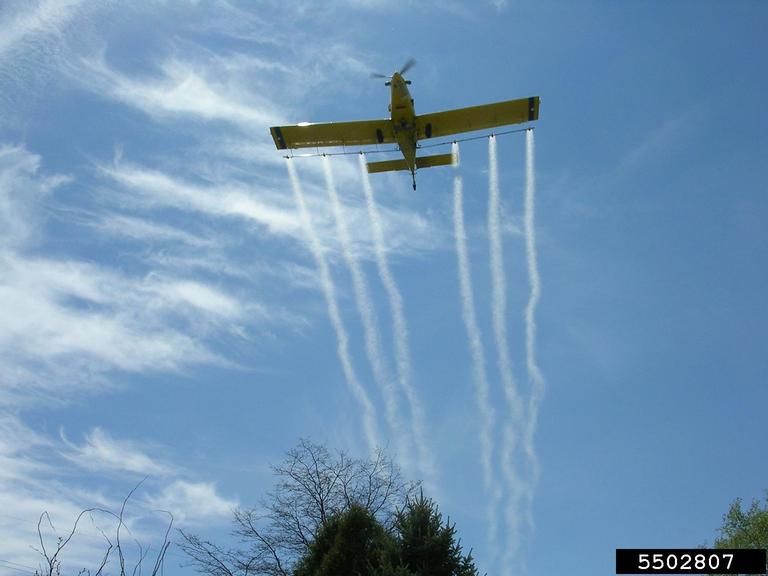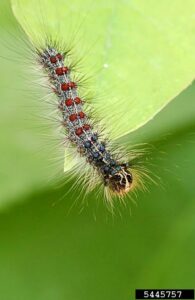Treatments for the Invasive L. dispar Begin in Western NC
go.ncsu.edu/readext?801814
en Español / em Português
El inglés es el idioma de control de esta página. En la medida en que haya algún conflicto entre la traducción al inglés y la traducción, el inglés prevalece.
Al hacer clic en el enlace de traducción se activa un servicio de traducción gratuito para convertir la página al español. Al igual que con cualquier traducción por Internet, la conversión no es sensible al contexto y puede que no traduzca el texto en su significado original. NC State Extension no garantiza la exactitud del texto traducido. Por favor, tenga en cuenta que algunas aplicaciones y/o servicios pueden no funcionar como se espera cuando se traducen.
Português
Inglês é o idioma de controle desta página. Na medida que haja algum conflito entre o texto original em Inglês e a tradução, o Inglês prevalece.
Ao clicar no link de tradução, um serviço gratuito de tradução será ativado para converter a página para o Português. Como em qualquer tradução pela internet, a conversão não é sensivel ao contexto e pode não ocorrer a tradução para o significado orginal. O serviço de Extensão da Carolina do Norte (NC State Extension) não garante a exatidão do texto traduzido. Por favor, observe que algumas funções ou serviços podem não funcionar como esperado após a tradução.
English
English is the controlling language of this page. To the extent there is any conflict between the English text and the translation, English controls.
Clicking on the translation link activates a free translation service to convert the page to Spanish. As with any Internet translation, the conversion is not context-sensitive and may not translate the text to its original meaning. NC State Extension does not guarantee the accuracy of the translated text. Please note that some applications and/or services may not function as expected when translated.
Collapse ▲This month, the N.C. Department of Agriculture and Consumer Services is beginning treatments for Lymantria dispar (formerly known as ‘gypsy moth’) at sites within Surry, Buncombe, Yancey, and McDowell Counties. The four areas targeted for treatment include:
- 2,080-acre block near the Lamsburg community in Surry County (as early as June 3)
- 1,760-acre block around Mount Mitchell in both Yancey and Buncombe counties (as early as June 14)
- 2,845-acre block near the Celo community in Yancey County (as early as June 14)
- 1,330-acre block near Marion in McDowell County (as early as June 14)
To treat these areas, low-altitude fixed-wing aircraft will disperse moth pheromone via a product called SPLAT GMO. This inundates the area with the pheromone, resulting in the male moths being unable to detect pheromones released by the females. This decreases mating success and subsequently reduces moth populations the following spring. Pheromones are chemical communication signals that are species-specific; therefore, the treatment is not harmful to humans, animals, or plants, and it will not affect other insect species.

In a management tactic called “mating disruption”, aircraft disperses L. dispar moth pheromone, making it challenging for male and female moths to find each other, reducing mating and thus caterpillar hatch the following year. Image: B. McNee, Wisconsin Department of Natural Resources, Bugwood.org.
In addition to these four sites, in mid-April, a treatment was conducted in Buxton (Dare County) that targeted caterpillars.

L. dispar caterpillar is hairy with 5 rows of paired blue dots followed by 6 rows of paired red dots along its back. They feed on the foliage of over 300 species of trees and shrubs. Image: Jon Yuschock, Bugwood.
L. dispar is a non-native invasive insect that feeds on the leaves of over 300 different species of trees and shrubs, predominantly oaks and other hardwoods. Heavily infested trees may be completely defoliated, leaving yard trees and entire forests more susceptible to attacks from other pests. Severe infestations that occur year after year often lead to tree death. These caterpillars can also pose public health concerns for people with respiratory problems. In areas with high-density L. dispar populations, the caterpillar hairs and droppings may cause severe allergic reactions.
Native to Europe, L. dispar was introduced near Boston, MA in the 1860s and has been a problem in eastern hardwood forests since. NCDA&CS has addressed spot introductions of the moth across North Carolina since the 1970s.
For more information, or to request treatment notification via text or email, visit the NCDA&CS website or contact NCDA&CS toll-free at 800-206-9333. Updates, including spray start dates, will also be posted on Twitter at @NCAgriculture.


